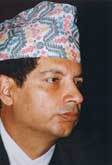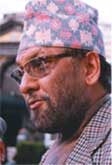 Every once in a while Nepal's National Planning Commission goes through an existential crisis. The NPC is always in a heads I lose tails you win situation with politicians. When things go wrong, planners are blamed and in the rare occasion when things go well, politicians take the credit.
Every once in a while Nepal's National Planning Commission goes through an existential crisis. The NPC is always in a heads I lose tails you win situation with politicians. When things go wrong, planners are blamed and in the rare occasion when things go well, politicians take the credit.
The NPC is currently putting final touches on its Tenth Five- Year Plan, which some are already saying will be Nepal's "Poverty Reduction Strategy". It is reviewing and evaluating the Ninth Plan and incorporating changes into the new document expected to be readied later this year.
Nepal has been making Soviet-style five-year plans since 1956, but doesn't have much to show for it. Will the Tenth Plan be any different? "We are trying to focus on poverty reduction, to be attained by maintaining a stable macro-economy," says Dr Shankar Sharma. "There are five priority areas: agriculture, health, education, water resources and rural infrastructure."
Sharma thinks the new five-year plan may be the one that finally does it. It will primarily be focussed on poverty-reduction, and be the first one to be backed with a realistic budget. But that was before the emergency was declared and the army was deployed against the Maoists. The added expenditures for the war and how it will unfold may reflect on the eventual outcome.
The Tenth plan's budgetary backup will be the Medium Term Expenditure Framework (MTEF) which is now being drawn up, and its finalisation may help secure funding.
 Every new five-year plan is greeted with a chorus of criticism about the effectiveness of the NPC. This time will be no different, and there is already talk of a major reshuffle of its membership. The fundamental questions about whether we need an NPC keeps coming up, especially since 1990 when short-term political expediency has become more important than a long-term strategy, but the debate usually fizzles out.
Every new five-year plan is greeted with a chorus of criticism about the effectiveness of the NPC. This time will be no different, and there is already talk of a major reshuffle of its membership. The fundamental questions about whether we need an NPC keeps coming up, especially since 1990 when short-term political expediency has become more important than a long-term strategy, but the debate usually fizzles out.
Today's NPC is a misfit. It is outside the political loop because even though the Prime Minister chairs it, it does not have effective cabinet representation. The NPC was created by a cabinet decision and does not have statutory anchor.
Its policies therefore do not reflect the political priorities of parties or a nationally accepted framework that is vetted by parliament. And for Nepal's donors, the NPC remains a convenient window through which to bypass politicians and the bureaucracy and push projects of choice.
It wasn't always like this. During the Panchayat, the NPC was at the centre of things. Those were the days when it had a role in controlling other ministries-possibly reflecting the authority of the absolute monarch. Dr Mohan Man Sainju who was vice-chairman during the 1980s remembers: "We did not have to worry who the prime minister was and how political gimmicks would influence us." Sainju, like technocrats before him, were appointed by the king and were able to focus continuously on planning and co-ordination. "Our chain of command was very clear," adds the economist who now heads the Institute of Integrated Development Studies (IIDS).  Many former members dismiss today's NPC as a "dead institution". Even technocrats working in it say it has become an employment agency for political apointees and rejects from other ministries. They wallow there until retirement or till some political benefactor comes and bails them out. "This has to change, otherwise we may as well close it down," said one insider.
Many former members dismiss today's NPC as a "dead institution". Even technocrats working in it say it has become an employment agency for political apointees and rejects from other ministries. They wallow there until retirement or till some political benefactor comes and bails them out. "This has to change, otherwise we may as well close it down," said one insider.
Even after democracy the NPC could have worked to push the strategies of the party in power. But, of course, things didn't work out that way. NPC appointments ended up reflecting the power tussles within the ruling party eroding the even credibility of the top planning jobs. After ten years of democracy, NPC jobs are not as coveted as they used to be.
Engineer-economist Dipak Gyawali was sounded out for NPC membership but turned it down. He does not mince his words about why: "The NPC has a basic structural flaw. It has little, or no role today." Gyawali's main criticism is that the NPC doesn't have the institutional mechanism to analyse and learn from past failures. "I have not found any analysis done by NPC on major projects such as the Arun III or even Mahakali," says Gyawali. "What is the point if decisions on such impo rtant projects with serious implications on the country are made without even getting the NPC's input?"
NPC insiders admit that the professional team of technocrats, all well trained and experienced, end up being government speechwriters or proposal writers for donors. They are convinced there is no way the NPC can be reformed without a clarification on the chain of command.
Today even NPC members don't hesitate to admit that the institution could have done better. Many are also convinced it is not possible within the existing governance mechanism. Still, most people we spoke to for this article agreed on the need for an agency to do the "big-picture long-term thinking".
 Says Sharma: "There is no question that we need a vision or a plan, or whatever you want to call it. Someone has to do it. Our concern should be why the plans haven't worked." One of the reasons could be the NPC's overall incompatibility with the changed polity after 1990, which reflects on plan implementation.
Says Sharma: "There is no question that we need a vision or a plan, or whatever you want to call it. Someone has to do it. Our concern should be why the plans haven't worked." One of the reasons could be the NPC's overall incompatibility with the changed polity after 1990, which reflects on plan implementation.
Agriculture, for example, was the priority of the 9th plan but according to Sharma, investment in the sector in real terms was actually down by almost 36 percent during the plan period. And every plan is derailed because of funding gaps caused by diversion of funds to new politically tinged projects.
Despite all this, Finance Minister Ram Sharan Mahat, who was once vice-chairman in the early 1990s, remains a strong advocate of retaining the NPC. "That is one place where we can get professional analysis done. There is still a role for planning. And it is still relatively unaffected by politics."


